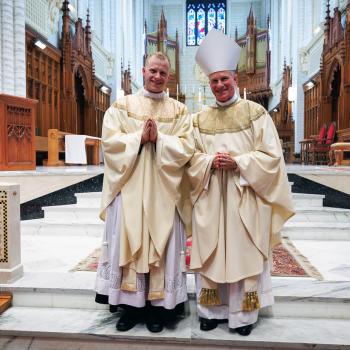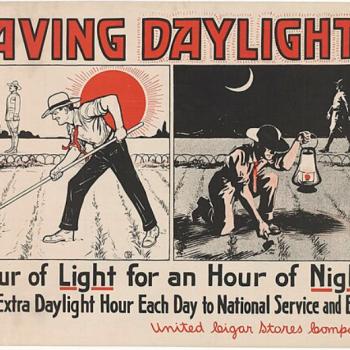Editors' Note: This article is part of the Patheos Public Square on Slow Living. Read other perspectives here.
We can make our minds so like still water
That beings gather about us that they may see,
It may be, their own images,
And so live for a moment with a clearer,
Perhaps even a fiercer life
Because of our quiet. ~ William Butler Yeats, "The Celtic Twilight"
My friend Eve is a devout Jew who practices the Sabbath faithfully with her beloved husband. One weekend she went to a center where the person scheduled to lead the retreat did not show up. "We had a sudden, unexpected space, in which there was nothing we had to do. We decided simply to wait until whatever happened, decided to do itself. We had no agenda, no plan. Simply a state of Shabbas. I love being in this state in Shabbas — everyone was out in the sun, some women were on the grass, trying different body movements. Some were walking, some singing, each in their own way, their own time." Eve said that in this leaderless "workshop" the participants became quiet enough to hear whatever was arising, and then, simply follow it.
In the traditional Jewish Sabbath there are thirty-nine prohibitions, activities forbidden for Jews to perform when they are faithfully observing Shabbas. Each of the prohibitions (Sowing, Plowing, Reaping, Threshing, etc.) is a form of labor, or work. These thirty-nine activities share, in being defined as "work," a common trait. Each activity involves taking something as it is (the earth, a field of wheat) and turning it into something else (plowing the earth into fertile rows for planting; reaping the field by removing the wheat from the place where it had been growing).
So when the Hebrew Bible says, Six days shall you labor, but on the seventh day, you shall rest, it creates two distinct forms of Time, with two very different ways of living within each kind of Time. In ordinary time, we work for our bread, for our family, for our children, our home, our fields. In Sabbath time, we see things as they are — but we do nothing to change, improve, or turn those things into something different.
In Sabbath Time, we surrender into a world without need of change. We slowly come to see the world with different eyes, fresh, and new. We see the field not as a crop to be harvested, but as a gently flowing ocean of wheat, an abundance of texture shaped by gentle breezes. We see the unplowed earth not as a field crying for the sweat of our brow, but as the earth, God's creation, offered freely as a gift to us. Unplowed, unplanted, it is in this moment a blessing of fecundity, and promise, deeply sufficient, even beautiful, just as it is.
Without Shabbas, the world would forever be a place relentlessly in need of repair, of change, of laborious days and nights without end. It would be a place where all our seeing would land upon a world saturated with things, and tasks, and everything wrong, or unfinished, not yet made right. Incomplete.
In Sabbath time, while nothing in the world is changed, on this day, nothing is incomplete. We see things as they are, and marvel at their magnificence, and give thanks. These stones, tomorrow they may become a wall. But today, they are stones, each one uniquely shaped as if by a master sculptor, resting in the sun, each catching some glistening twinkle of light that reflects and plays off the surface of the next, as the sun joyfully and effortlessly moves across the impossibly blue sky. Everything is beautiful — not because of what it has been, not for what it will be. It is perfect and good, just as it is.
And God saw that it was good.
When do we ever find such deep permission, to stop, to see that it is good, this world, this life, this day? Just as it is, without our effort or interference? When do we hear the call, when do we allow ourselves to surrender so completely to non-productive time, to be allowed to be stopped, to rest, to allow things to be as they are, and to marvel at the unattended miracle of it all?
This is what it is to live in Sabbath time — to see, taste, touch, smell, listen to the still, small voices, rejoice in the simple elegance of Life itself, in all its sensual splendor. And, nearly giddy with excitement, to drink long and deep from the sheer magnitude of experiencing all of it in this body, with all our senses, an ecstatic prayer of gratitude erupting in our hearts, grateful for the astonishing privilege of being alive, free of struggle or striving, awash in the midst of this unimaginably beautiful creation God made for us.




